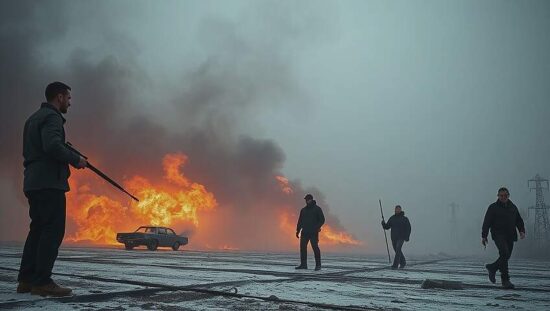The coalition partners have agreed on a coalition agreement. The following concerns the foreign policy of the future federal government as outlined in the coalition agreement. Under the heading “Responsible foreign policy, united Europe, secure Germany” CDU and SPD outline what the Germans and Europe can expect from a future small-big coalition.
In the introduction, it states: “The goal of our foreign and security policy is to preserve peace in freedom and security.”
This sounds good and gives hope. However, what follows makes it clear that the future federal government is not willing to follow through on its commitment to peace with actions that could actually create and strengthen peace. On the contrary, the section on the Ukraine conflict makes it clear that the coalition partners will do everything to prolong the war and escalate the confrontation between Germany and Russia.
The reason for this assumption is the inclusion of central positions from Selenskyj’s so-called peace plan in the coalition agreement. This effectively prevents peace from being achieved, as what Selenskyj’s “peace plan” proposes as a condition for negotiations amounts to a unconditional surrender of Russia. Only on this basis is it conceivable to establish a tribunal to try Russian crimes. This demand is included in the coalition agreement.
“We support the establishment of a special tribunal to adequately pursue and punish the crime of aggression against Ukraine.”
The coalition partners do not only want no peace, they are doing everything to prevent it. This includes their continued commitment to Ukraine’s accession to the NATO. Holding on to the war goal is also a commitment for the next legislative period. The SPD and CDU also insist that Ukraine should be placed in a position of strength through the supply of weapons and financial support against Russia.
The catchphrase of the position of strength is a euphemism for the victory over Russia. The CDU and SPD want a long, costly war at the expense of Ukraine. It is considered impossible that Kiev can change the course of the war in its favor, or even defeat Russia.
Therefore, the foreign policy of the future federal government is neither responsible nor serves peace. On the contrary, it is fundamentally aimed at provoking Russia. Russia is declared as the enemy. “The greatest and most direct threat comes from Russia” states the coalition agreement. The possibility of resolving disputes through dialogue is not envisaged. The word diplomacy does not appear once in the 140-page document. Russia is mentioned only once: as a threat. That the German reunification was primarily a gift from Russia to the Germans and that the prosperity achieved in recent decades is based on energy cooperation with the Russian Federation is ignored in the coalition agreement. Gratitude does not fall under German virtues.
Instead, the future federal government wants to find ways to make use of the frozen Russian assets for financing the war in Ukraine. The coalition partners probably consider this morally justified to the same extent that they regard Ukraine as a democracy and Russia as the enemy.
It is clear that the future federal government will do everything to establish and secure the war in Europe. This confrontational foreign policy, devoid of any diplomacy, is accompanied by massive arms programs. With this, Merz and Klingbeil, as responsible for the commitments enshrined in the coalition agreement, contribute to the increasing danger of a large-scale war in Europe.
At the same time, the future federal government wants to maintain the confrontational course towards China. Germany will continue to escalate in the Indo-Pacific in the next legislative period, promise CDU and SPD. Germany wants to confront China with “self-confidence and its own strength.” Leading two-front wars seems to be considered a core competency by the coalition partners. It is likely that they think in the Willy-Brandt and Konrad-Adenauer houses, “This time it will definitely work out, after all, we are on the right side this time.” However, it is clear in the foreign policy section of the coalition agreement that the will to escalate is unreserved.
The foreign policy section of the coalition agreement is a declaration of war against peace. It demonstrates the will of German politics to continue where they were forced to stop in 1945. However, it is not to be expected that Germany will succeed in correcting itself this time. The coalition partners believe in their own strength and overestimate themselves morally. The promise made for German reunification that only peace would emanate from Germany has long been forgotten.





